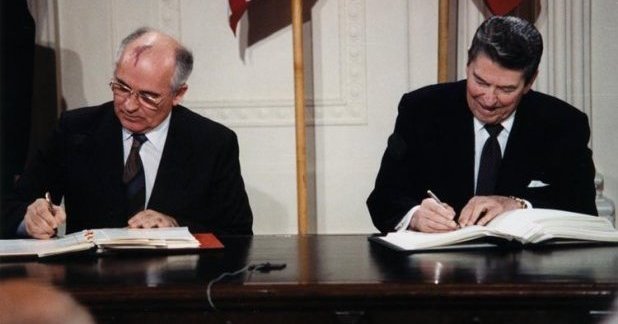Thus, the Germans of the West could see through this enormous concrete wall standing in the middle of the city, the ultimate expression of division, opposing the capitalist world to the Soviet world. The Cold war was to some extent under their windows. Built during the summer of 1961 to dyke up the flood of emigration of the Easts Germans to the West, it is known that the fall of this “Wall of shame” will be the prelude to the collapse of the USSR. But what is it today the perception of this event of Russia? During the time of the celebrations and other commemorations to come, a new wall be built up between the satisfaction of Europeans and the delicate treatment of this bracket of the history by Russian collective mentalities?
Between construction and deconstruction
It must be initially underlined what the delicate treatment of this question seeks to apprehend: a feeling, a perception. Twenty years after the fall of the Berlin Wall, the two concepts suggested by Gorbachev in April 1985, “glasnost” and “perestroika”, remain regarded as the guidelines led to the end of the USSR. Generally translated into French by “freedom” the first and “reorganization” the second, while often forgetting to mention that they make initially references in Russian to a process of construction/deconstruction. In a word, a deconstruction for freedom and the construction of a new economic and social space within the borders of the ex-USSR. This semantic remark enables us to see how much the arrival of Vladimir Putin to the presidency of the Federation of Russia in December 1999 coincided with the rebuilding of the “Russian house”. But between the deconstruction of the wall a certain evening of November 1989 and the new face of the Russia of Putin, what has been going on?
Far from proposing a genealogy of the Russian history during the last twenty years, only trying to recall that Russia, entered from 1992 to a phase of finding its way or mistake which culminated in August 1998 a financial crisis which turned into an economic crisis. However if it is possible quantitatively to measure the extent of a crisis, we often forget to calculate his qualitative consequences. In the case of Russia, such a crisis was the synonym of the pauperization of the middle-class. The resentment of most of the population against its elites was durably affected. But do we have to see only in the fall of the Berlin Wall the starting point of these political, social, economic disturbances? Of course not. However, it is undeniable that once the wall has fallen, it is a long tunnel that engulfed Russia. To be extracted, it was necessary for it, it still needs, or it will always be necessary for it according to the points of view, to reconsider concepts as elementary as the State, politics or economics. As briefly underlined the president Medvedev in an interview given to CNN on September 20, 2009, “Russia is a young democracy”.
The return of Russia
In the same time, it is not counted any more the published articles one or two years ago devoted to the return of Russia on the international scene. For this reason, it begins again to work out today, by the voice of its Foreign Minister Serguei Lavrov, a “desideologized” vision of the international relations like Gorbatchev did in February 1986. The co-operation between the States must be encouraged and their safety guaranteed. They are the principles quite far away from the policy esltienne worked during the decade of 1990, in the diplomatic field, was rather isolationist. On the internal plan, it is advisable to evoke the article “Russia ahead” written by president Medvedev in October 2009 and which found a certain echo in the national and international press. In this long article of two pages with a rather sharp tone, the president draws up a kind of inventory of qualities and failures of his country in the beginning of the XXIe century. He insists in particular on the structural limits of the Russian economy and mentions also the Soviet heritage which made the State in collective mentalities the single remedy for all the pain of the society. The president does not hesitate either to evoke the persistence of a social sphere still taken from the “sovietism”. The formulation of such reports still a few years ago would certainly have nourished many oppositions and of critics in the country, signs that there exists today in Russia a shared will to build a tomorrow on the ruins of yesterday, meaning the fall of the Berlin Wall and the collapse of the Soviet Union.
Thus, we can retain that Russia which repairs itself to attend the celebrations indirectly commemorating the fall of the Wall presents a very different face of which it showed in November 1999. It should not be forgotten either that the European Union, by its widening in the East, also changed. If the border between that time the European Economic community and the USSR was a wall of several meters high, it is today recognized as a borderline, in particular between Poland and the Federation of Russia. Let us guarantee that they are the same the collective mentalities of on both sides of this border.



Follow the comments: |
|
